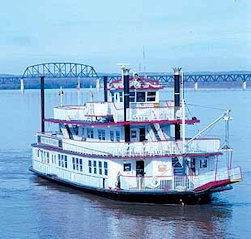
|
Some Common Myths Thought to be True - Myth 118
Myth 118: Robert Fulton Invented the Steamboat
A savvy artist-turned-technologist took steamboat inventions and innovated them
into the first viable commercial steamboat service.
|
| Steamboat | |
|
Fulton ventured into London society after he painted Benjamin Franklin's
portrait. While abroad, Fulton left the arts for a career in canal and
shipbuilding. He was interested in the recently-invented steam engine, and
thought it could be used to power ships. Fulton's vision was not original; many
others had entered the field, and the unfortunate inventor John Fitch had built
a working steamship already. But like Henry Ford, Fulton's genius lay not in
invention but in adaptation for the marketplace.
|
|
| ⇦ Back to Myth 117 Return to Myth Choices Page 9 On to Myth 119 ⇨ | |